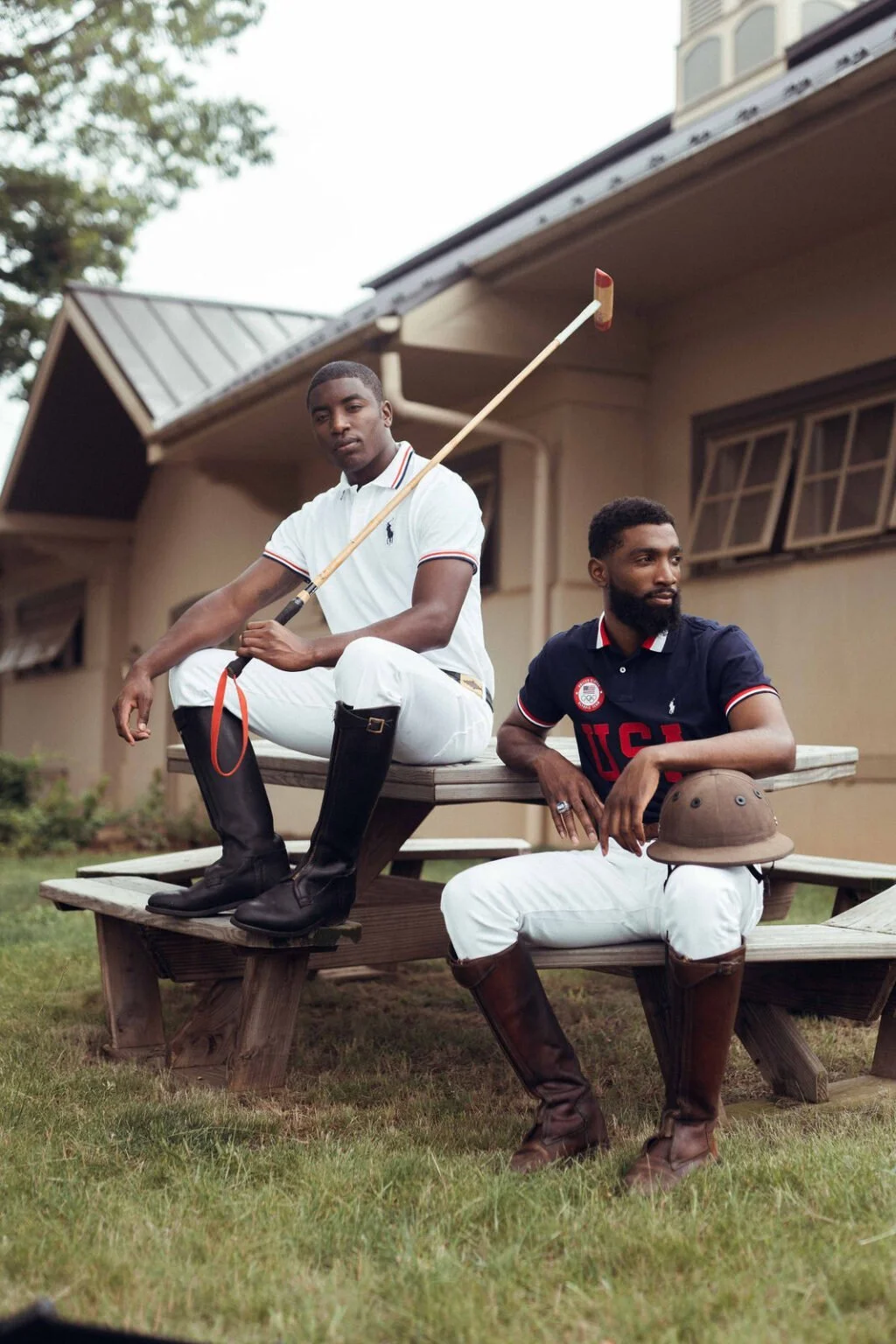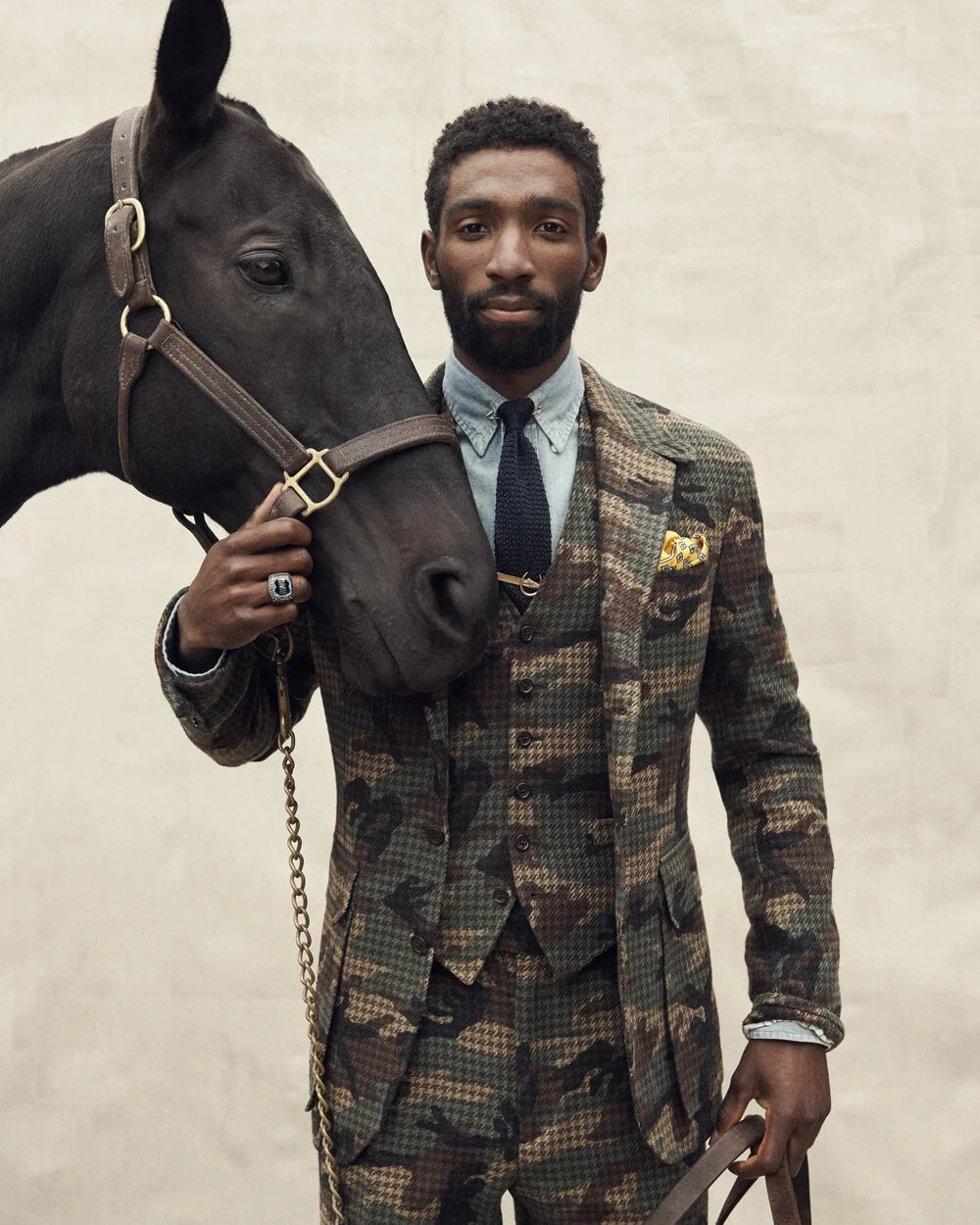Reins of Change: Polo's Reckoning with Race, Class, and Culture
How a sport of empire became a ground for equity, identity, and cultural redefinition.
Kareem Rosser. National polo champion, wearing Ralph Lauren via Ralph Lauren
Polo was never meant to be inclusive. It came wrapped in privilege, in horsepower, in heritage stitched into saddles and stitched into shirts. It was played for centuries before by Persian, Central Asian, and Indian nobility as a pastime of power and control within the empires. Polo quickly became more than a sport; it was a tool of imperial identity. Over time, new players stepped in, riders who didn’t fit the mold but refused to stay outside it. What was once a colonial pastime is now being reimagined—not just as a sport, but as a stage for resistance, representation, and something entirely new.
But even in its tightly guarded world, cracks have begun to form, and through them, stories of resilience and resistance have emerged from athletes who were once excluded.
The Field Was Never Even
Polo wasn’t just a sport; it was a social marker. Access was expensive, and horses, training, attire, gear, and travel were unattainable for most communities. Historically, polo wasn’t only about playing the game; it was about being allowed in the room where it was being played.
But like many sports forged in exclusion, its evolution tells a different story when you look closer. Across the last decade, a small but powerful wave of POC athletes has forced polo to go face to face with its elitism. And that very shift didn’t start at the top, it began in the stables, in after-school programs, and in urban cities like Philadelphia.
Work to Ride: Where Change Saddled Up
Work to Ride, a Philadelphia-based nonprofit, has redefined the entry point into the sport of polo. Founded in 1994, the program offers equestrian access and academic support to underserved youth, flipping the script on a sport long reserved for the elite. The program became an unexpected launchpad for three riders, Kareem Rosser, Daymar Rosser, and Shariah Harris.
These athletes didn’t grow up on rolling estates or even groomed fields. Their journey into polo began with early mornings in the barn, and horses that towered over them from a young age. They each carved out successful careers that forced polo to reckon with its own gatekeeping.
Brothers Kareem Rosser and Daymar Rosser via Recreational Habits
In 2011, Kareem Rosser and his Work to Ride teammates made history as the first all-Black team to win the National Interscholastic Polo Championship. It was a victory that didn't just challenge the status quo. Fortunately, Kareem’s rise didn’t stop there. As a student at Colorado State University, he led his team to a National Intercollegiate Championship and was named both Polo Player of the Year and Intercollegiate Player of the Year. His talent took him around the world.
But Rosser is more than an athlete and a game changer. In his memoir Crossing the Line, he explains the challenges of growing up in West Philadelphia, the weight of being “the first,” and the healing power horses brought him. Polo became both a metaphor and a medium since it was a space to renegotiate identity, race, and class.
Daymar Rosser via Ralph Lauren
Daymar Rosser was just five years old when his older brothers got him enrolled in Work to Ride. At the time, he was the smallest boy on the biggest horses–and he was terrified.
That fear didn’t last; nearly two decades later, Rosser is a two-time national champion and a fierce competitor who led the newly formed Roger Williams University polo team to a national title in just its second season. His journey is a case study in transformation, one that is not just personal but cultural. In a sport that rarely saw Black riders, he didn’t ask for a seat at the table. He built his team and led them to victory.
Shariah Harris, Ralph Lauren Spring 2019. Shot by Sharif Hamz via Ralph Lauren
Shariah Harris found polo by accident when her mother took a wrong turn and stumbled across the Work to Ride stables. Her family had no idea what that detour would mean for the future of Shariah Harris.
In 2017, she became the first Black woman to compete in the highest tier of U.S. polo, joining the prestigious Postage Stamp Farm team at the Silver Cup. Her journey was marked by persistence since belonging wasn’t given.
When Fashion Co-Signs: Ralph Lauren & Polo Sport
Meanwhile, on the sidelines, a different kind of identity was being shaped. In 1992, Ralph Lauren launched Polo Sport, an activewear line designed to fuse performance and prep. Suddenly, the word “polo” no longer only evoked mallets and matches–it was also gym bags, windbreakers, and Olympic uniforms.
Ralph Lauren didn’t invent the sport, but he helped democratize its aesthetic. By outfitting Team USA for the Olympics, dressing Wimbledon officials, and branding “Polo” as an aspirational lifestyle, the brand became a paradox. Its logo once symbolized exclusivity, but in the hands of youth from urban areas like Harlem, it became a flex of reinvention.
Sport as Stage and Fashion as Protest
Today, polo lives in tension. On the field, it remains a sport where cost, land, and legacy still limit its accessibility. But through athletes like Kareem, Shariah, and fashion’s co-sign, the sport’s narrative is shifting to see the horse not just as luxury, but as a symbol, tool, and a challenge to everything the game once stood for. Although in many ways it’s the wardrobe that’s carried the message.
Ralph Lauren, Work to Ride. Spring 2019, Shot by Sharif Hamz via Ralph Lauren
What began as a rigid, colonial pastime has evolved into a canvas for individuals who remain persistent. Athletes wear the weight of history, but also the possibility of its reinvention. And off the field, fashion continues to play a role in that evolution as subtle, bold, ironic, and celebratory.
The Walk Forward
Polo, like fashion, is a language and a symbol. Its future will be drawn by those who refuse to let tradition dictate belonging. And just as riders redefine the sport on the field, culture-makers remix it off it through wardrobe, image, and presence.
This isn’t about giving polo a new face, it’s about giving it a new foundation. One where prestige gives way to purpose, where the uniform doesn’t define you, and where the horse becomes a banner for those bold enough to ride.
Kareem Rosser, Crossing The Line.






